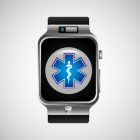
One day, it might be possible to spot illness the same way we track exercise habits and sleep patterns: with wearable sensors. A new study compared baseline normal readings on 60 people, then looked for deviations to see if changes might be tied to new environmental conditions, illness, or other factors that can impact health. Because most people only get vital signs checked at a physical or when they’re sick, wearable sensors might help doctors do a better job of detecting the onset of disease and monitoring its progression, says Karandeep Singh, a medical researcher at the U-M who wasn’t involved in the study. “Physiological changes precede the development of symptoms for a variety of illnesses, and being able to detect these changes early may bring patients to attention much earlier when diseases are more readily treatable and potentially curable.”
